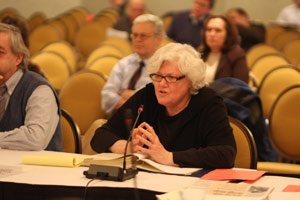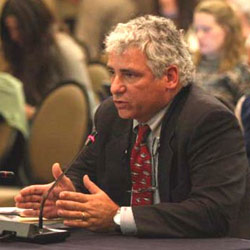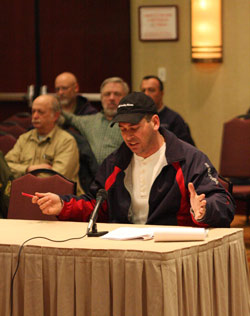 Harriet Didricksen, New Bedford scallop boat owner. “It’s turning into industrial fishing. It’s vertically integrated corporations joining up with other vertically integrated corporations forming fleets. It’s going to take away hope. There is no hope to advance and there will be less opportunity with less boats and less jobs.” © Photo by Sam Murfitt Harriet Didricksen, New Bedford scallop boat owner. “It’s turning into industrial fishing. It’s vertically integrated corporations joining up with other vertically integrated corporations forming fleets. It’s going to take away hope. There is no hope to advance and there will be less opportunity with less boats and less jobs.” © Photo by Sam Murfitt
|
The possible implementation of “quotas” by the New England Fishing Management Council within scallop fleet has created friction between large fleet owners and owners of small fleets and independent vessels. The possibility of large fleet owners with deep pockets buying out most or all independent and small fleet owner’s permits threatens small fishing communities.
Single permits, many small fleets, widely dispersed small harbors and processors lead to an inefficiency in the fishery that benefits of the scallop resource. However, it requires more enforcement effort that the National Marine Fisheries Service (NMFS) wishes to avoid. Currently, there are some crews and equipment shared by two vessels. These owners would prefer to put them, and the permits on one more effective vessel with the corresponding increase in days at sea. Large fleet owners would thereby reduce overhead by using far fewer vessels and fewer employees.
The switch to ITQ’s by the American clam industry cost the fleet 400 jobs. Under the “Crab Rationalization Program” in the Alaskan crab fisheries, 900 crew members lost their jobs which caused economic harm to the local communities. Single permit owners, in theory, would be freer to fish when weather or market conditions are favorable, mitigating the “race for fish” and would reduce the “overcapitalization” of fleets. In reality though, many large fleet owners would increase capacity by limiting their fishing efforts to more efficient vessels. The ability to create super-capacity vessels gives them an insurmountable advantage, and the ability to drive small fleet vessel owners out of business.
In time, small alternate suppliers and processors would be forced to consolidate having a negative effect on the number of small businesses and jobs in fishing communities. On average, boats use up to 20 different businesses of different types with a conservative average of 6 or 7 employees per business. The income to a community from twenty businesses, 140 employees and their families and the taxes they pay is considerable.
One option recommended by small communities’ advocates is the dedication of quotas to regions allowing local communities to control their own fisheries. This could possibly avoid the loss of jobs in areas where fishing is the only employment (As in Washington County, Maine) and the decentralization of fisheries which will foster the delivery of fresh fish to local markets rather than it being sent overseas or made into other products.
 Attorney Stephen Ouellette testifying at a NEFMC meeting. “There are currently approximately 325 limited access vessels in the fishery, if these 325 vessels had stacked permits, cutting them in half, the loss of income to the local communities is conceivably $73 million in payroll. © Photo by Sam Murfitt Attorney Stephen Ouellette testifying at a NEFMC meeting. “There are currently approximately 325 limited access vessels in the fishery, if these 325 vessels had stacked permits, cutting them in half, the loss of income to the local communities is conceivably $73 million in payroll. © Photo by Sam Murfitt
|
Dana Rice, Council member from Winter Harbor, ME, requested a socioeconomic study at the January 22nd Scallop Oversight meeting. He said, “this is nothing but an exercise in social engineering.” Another negative result of quotas will be an increase in “highgrading” catch and the increase in bycatch, which may already be the most critical problem faced by the New England Fishing Management Council. Quota opponents have said that independent and small fleet boats retained inefficiency that is a benefit the resource in that it slows harvest rates. The small fleet also relies more on the skills of workers, than on the increasingly efficient capital, as in larger and more efficient vessels.
Mr.Gary Hatch of Gary Hatch Fisheries in Rockland, Maine, in business since 1959, and Harriet A. Didriksen of Frontier Fishing Corporation and New Bedford Supply in New Bedford are quota opponents. It is their position that stacking permits and consolidation of the scallop fleet will put the scallop industry on a path to over-fishing and self-destruction. Harriet Didriksen said “this is just an economic move; this has nothing to do with resources. If there is not a fishing industry, they (federal fishing management) are not needed. This is not saving jobs; they are out of step with what is going on today. The fishermen are so far in the background that they are almost out of sight.”
Stephen Ouellette (whose law firm represents over 100 permits), in a letter to the New England Fisheries Management Council (NEFMC), states, “There are currently approximately 325 limited access vessels in the fishery, and Council figures show that with an ex-vessel price of $7.50 per pound, the owner’s profit after fixed costs is around $300,000, and crews’ wages on average are $450,000 per vessel, or approximately $65,000 per man.” If these 325 vessels had stacked permits, cutting them in half, the loss of income to the local communities is conceivably $73 million in payroll.
The NEFMC has conducted no study, as mandated by the Magnuson/Stevens Act, on the loss of independent and small fleets, or on their fishing communities on the New England Coast. This raises the potential for lawsuits. As Gary Hatch said, “It will be the same as what has happened with the ground fisheries. They reduce the days (at sea) so the independent and small fleet boats can’t afford them (permits), so the bigger boats gobble them up and we end up with what the National Marine Fisheries Service wants, “a large scale minimal fishery” that they can monitor and put observers aboard. They want to do away with the small coastal communities and the small fishing villages because they have a better idea, for the coast. Look at what they have done on the West coast. They have given the whole fishery to the big scallop boats and now the small towns out there are starting to fail as far as what their history always was as commercial (fishing) villages.”
 Paul Weckesser, New Bedford fisherman. “These people are asking for a bailout”, and when there are fishing cutbacks the single boat owner will pay disproportionately. © Photo by Sam Murfitt Paul Weckesser, New Bedford fisherman. “These people are asking for a bailout”, and when there are fishing cutbacks the single boat owner will pay disproportionately. © Photo by Sam Murfitt
|
“If people were allowed to put two permits on one boat,” Harriet Didriksen said, “I feel my boat would be worth half as much the day after that happened. Now I am 100% and I am viable, which is the way it has always been in fishing as I know it. I can take care of my boat and my men and make a decent living. I don’t know how else to say it, if stacking of two permits on one boat is allowed, my boat is less than half as good. I feel we will be forced out of business, we will not be viable much longer. It is unaffordable for young people to get into the business, and this will make it more unaffordable. It’s turning into industrial fishing. It’s vertically integrated corporations joining up with other vertically integrated corporations forming fleets. It’s impossible. It’s going to take away hope. There is no hope to advance and there will be less opportunity with less boats and less jobs. These fleet owners will have more control. There will be less jobs to go to.” In Cape May, NJ, said Didrcksen, “the underpinnings and support services, electronics and propeller people, they are gone. It is a ruination. They (NMFS) are going around blindfolded if they don’t see it.”
David Goethals said of his visit to the New Zealand fisheries (the fourth largest Economic Zone in the world) a few years ago, “Six corporations own 90% of the (New Zealand) fisheries and its captains and crew are considered “human capital”. The end result here may be questionable under the Magnuson Stevens act, according to several people considering this on anti-trust grounds. The Justice Department has already rejected a request to investigate the surf clam industry in that it is a portion of a larger industry and not a separate fishing industry.
The NEFMC Scallop Over-sight Committee met in Warrick RI on January 22, 2009, to further refine the Amendment 15 draft and finalize issues of capacity (stacking/leasing/quotas) in one of the only fisheries that is legally not over-fished. The committee’s attempt at “capacity reduction” with the stacking of two permits or a combination of a permit and up to one permit’s worth of leasing, opened a “Pandora’s box” of ownership and history problems
The owners want the history (of their fishing) to stay with the original permit, whereas for enforcement purposes, they want the responsibility of the permit to go with the fisherman leasing the permit. As Paul Weckesser, fourth generation New Bedford fisherman said, “These people are asking for a bailout” and when there are fishing cutbacks the single boat owner will pay disproportionately. An undercurrent among many independent and small fleet owners was that this was not capacity reduction but the council’s “regulating people, not the fishery,” and as such they were forced to consider bringing a lawsuit. The question of whether “quotas,” “capacity reduction,” or “stacking” (or leasing) are really ITQ’s seems to have been answered early Tuesday morning, February 10, 2009, when Dan Morris of the National Marine Fishery Service was asked to explain the process of a Limited Access Privileged Program referendum to the New England Fisheries Management Council. Independent and small fleet owners believe Amendment 15 would interfere with their right to make a living, destroy fishing jobs, destroy fishing communities, and the families that live in them. Olympia Snow, US Senator from Maine, said regarding the Magnuson Stevens Act, “they must not pursue consolidation to the detriment of fishing communities.”
|





